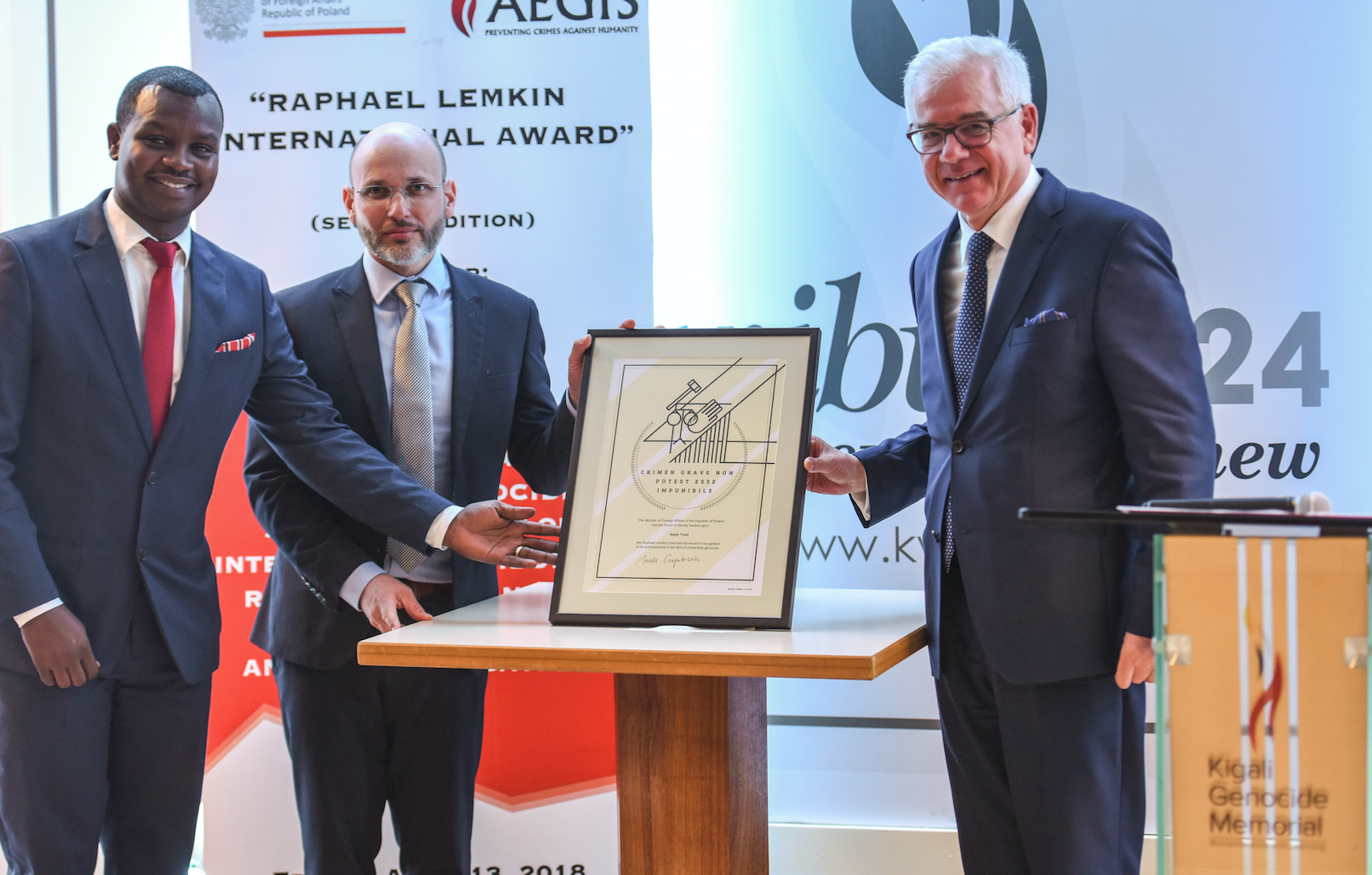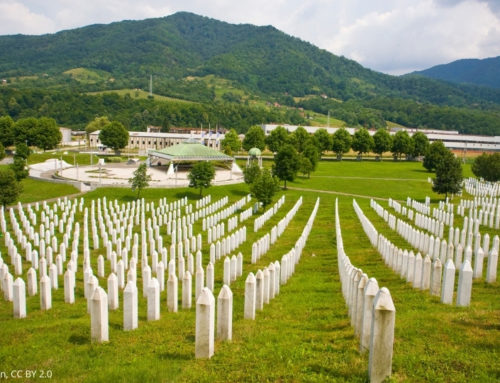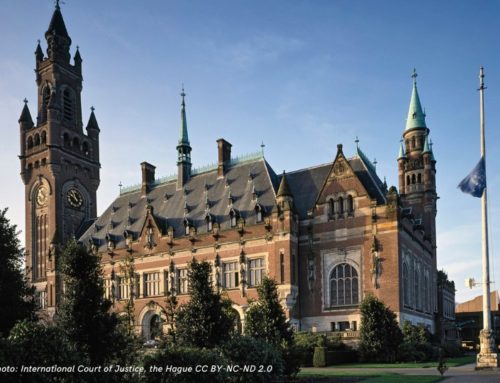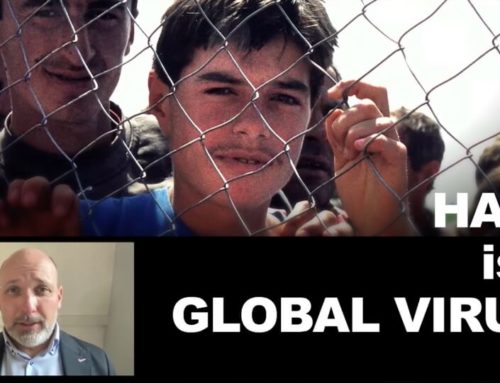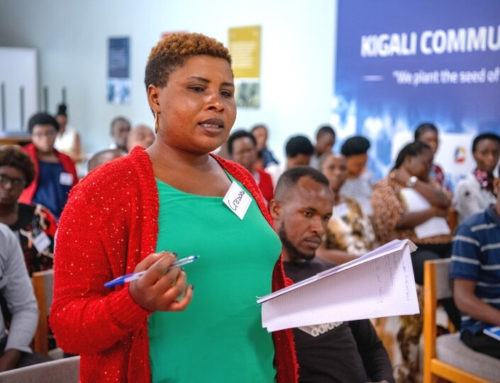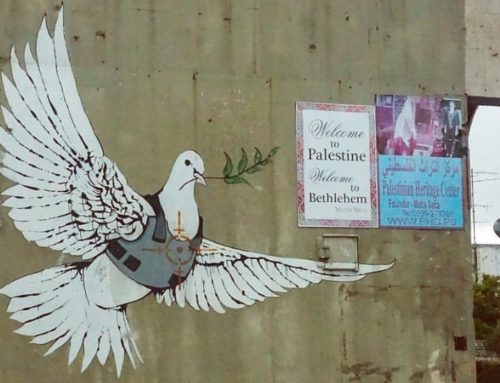On 13th April 2018, Aegis Trust was honoured to receive the second edition of the Raphael Lemkin International Award in recognition of its outstanding contribution to fighting genocide and other mass atrocities, in particular by educating the young generation in Rwanda through its Education for Sustainable Peace in Rwanda programme, and commemorating and honouring the victims of the 1994 genocide against the Tutsi.
The Raphael Lemkin International Award was presented to the Aegis Trust by the Minister of Foreign affairs of the Republic of Poland, the Honourable Jacek Czaputowicz.
The Award Ceremony was preceded by a seminar entitled “Preventing and Punishing Genocide. Judicial Legacy of International Tribunals. Role of Post-Conflict Reconstruction And Peace Education”. The panellists included judges of international tribunals Mr Vagn Joensen, Judge of the Mechanism for International Criminal Tribunals and former President of the UN International Criminal Tribunal for Rwanda, and Ms Agnieszka Klonowiecka-Milart, Judge of the UN Assistance to the Khmer Rouge Trials and Judge of the UN Dispute Tribunal, together with Mr Freddy Mutanguha, Aegis Africa Representative.
The invited guests including Rwanda Government officials, dignitaries and judges of international tribunals heard a special video message from Mr Adama Dieng, UN Under-Secretary-General and Special Adviser of the Secretary-General on the Prevention of Genocide who applauded the work of Raphael Lemkin, his legacy and the efforts of the Aegis Trust in preventing genocide and other mass atrocities.
Hon. Jacek Czaputowicz, Minister of Foreign Affairs of Poland, commended the great contribution of the Aegis Trust in preventing genocide and promoting peace to young Rwandans through Peace Education.
“Using the powerful tool of education, the Aegis Trust has been helping victims, documenting crimes, highlighting threats and making people more sensitive – wherever human life is hostage to criminal ideology,” Czaputowicz said. “The commitment of the Aegis Trust’s courageous and passionate team bolsters our faith in humanity. It definitely merits recognition by the international community.” He added, “Poland hopes that granting the Lemkin Award to the organization will support these educational efforts based on peace values.”
Hon. Olivier Nduhungirehe, State Minister of Foreign Affair, who represented the Government of Rwanda at the ceremony, recognised the efforts of the international community in fighting the ideology of denial and minimization of genocide. He stated that for this Day of Remembrance – Kwibuka24 – the United Nations, the African Union, the African Caribbean and Pacific Group of States, as well as many individual countries adopted “Genocide against the Tutsi” as official language,
In his acceptance speech, Dr James Smith, Chief Executive of the Aegis Trust, said: “I have no doubt, reading his concepts, that had Lemkin been alive, he would not have waited until 1994 to recognise genocide against the Tutsi in Rwanda or call it by its name. He would have campaigned in New York and Geneva throughout the 1960s against genocide in Rwanda, calling for prosecution and prevention.”
Dr Smith added, “In accepting the Raphael Lemkin International Award, the Aegis Trust is deeply honoured. We accept it on behalf of all Aegis staff and volunteers, our partners including the Government of Rwanda and all our supporters who made the programmes possible here in Rwanda. We are humbled that our own small contribution to prevention is being recognised. We hope it will inspire us all and future generations to redouble our efforts to preserve memory, share painful past experiences with openness and ensure the correct attribution and responsibility for past injustices and above all to protect, equally, all vulnerable groups. Here in Rwanda the description given to him is one we should all aspire to: ‘Ubumuntu’; a ‘member of humanity, with greatness of heart’.
About the Raphael Lemkin International Award
The Raphael Lemkin International Award was established on 4th September 2013 by Minister Radosław Sikorski. Its main aim is to improve knowledge about the diverse origins and consequences of the crime of genocide, as well as to enhance mechanisms to prevent mass atrocities through creating, consolidating and promoting international legal instruments in this field. The prize also highlights the central position that international law, in particular international humanitarian law and human rights, takes in Polish foreign policy, and commemorates the eminent lawyer.
About Raphael Lemkin
Raphael Lemkin (1900-1959) was a Polish lawyer of Jewish origin. He is the author of the term ‘genocide’, which he coined and defined in his 1944 book ‘Axis Rule in Occupied Europe’. He proposed and consistently supported the idea of an international convention on the prevention of genocide, which materialized in the form of the Convention on the Prevention and Punishment of the Crime of Genocide. The Convention was adopted by the UN General Assembly on 9 December 1948. Raphael Lemkin was nominated for the Nobel Peace Prize in 1950, 1951, 1952, 1958 and 1959.

